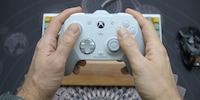
Product test
Gamesir G7 Pro tested: Premium features at a mid-range price
by Kevin Hofer

Gamepad, mouse or keyboard are great gaming tools. But using them requires a lot of skill. What if you can only use one hand or only your feet? People with disabilities depend on specially designed controllers and the right software. The gaming industry provides solutions, but in most cases, gaming is still a challenge for people with disabilities.
Games usually offer settings for people who are colour-blind or subtitles for deaf gamers. But this by no means allows everyone to enjoy gaming. People with disabilities have complex needs – especially when it comes to the controller. A regular controller has up to 17 buttons. This may satisfy most gamers, but imagine you can only use one hand. Now, half the number of buttons is probably too many already.
Fortunately, inventive minds come up with solutions such as custom controllers to gap the bridge and make gaming accessible to more people. Non-profit organisations often initiate such projects. Last year, a major manufacturer, Microsoft, joined in. But software solutions are the most common approach to making games accessible to as many people as possible.
Offering options for colour-blind or deaf people is one thing. Such settings have almost become an industry standard. Activision may have recently claimed the opposite to justify why they missed out on providing subtitles for the «Spyro» remakes. But fortunately, that's an exception.
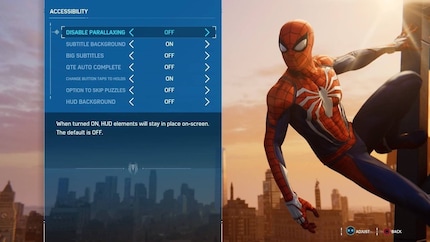
However, there are many more support features that game manufacturers could implement in their products. One positive example that stood out most recently is «Marvel’s Spider-Man» for the PS4. The game manufacturer Insomniac delivered a surprisingly wide range of options: For example, Quick Time events can be deactivated, which is appreciated by people who suffer from panic attacks. You can also replace tapping buttons with holding buttons, which helps in the case of carpal tunnel syndrome.
Another important option, which is a given for PC players, but still far too rare for consoles, are custom key assignments. Especially if you want to save your individual setup and not have to reconfigure it every time you restart a game. I'd love to see a norm introduced, which makes sure games offer such options out of the box. At least, blockbuster games seem to be leading the right way in this respect.
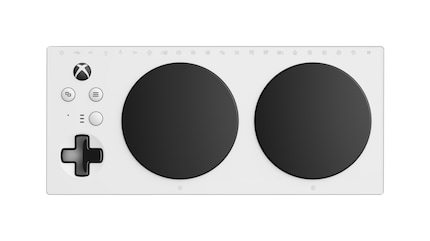
In 2015, Microsoft introduced a luxury controller: the Xbox Elite. What was primarily intended for hardcore gamers became very popular with people with limited mobility. The Xbox Elite is equipped with back paddles that can be replaced and offers the option to reprogramme each button and store it in custom profiles. Having reached the unexpected group of customers it did, Microsoft intensified its efforts in this area. The result? The Xbox Adaptive Controller. It looks like a digital turntable. And that's not far off from reality: The panels are touch-sensitive and can be operated without requiring the fine-motor skills of a thumb. On the back of it, there are connections for every single button of the Xbox controller, which can be connected to various devices such as pressure switches, rudders or mouth controls. This way, the controller can be operated with one hand and one foot; one hand and a shoulder or one foot and the chin.
Microsoft's Adaptive Controller remains an exception. Usually, people with limited mobility have to make do with DIY solutions such as this one-handed Joycon adapter created with a 3D printer.
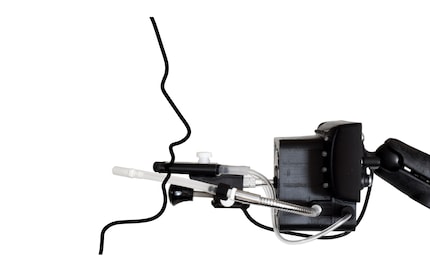
The «PUBG» streamer Rocky NoHands proves how efficient players with custom controllers can be. Rocky Stoutenburgh is paralysed from the neck down. But this doesn't stop him from gaming. With the Quadstick adapter, he controls the online shooter game by sipping on or puffing into the various openings. «PUBG was probably the hardest game,» he said to gaming magazine PC Gamer. «It took me about three days to make a layout.» He had to go without some commands – switching car seats, for instance, for lack of options.
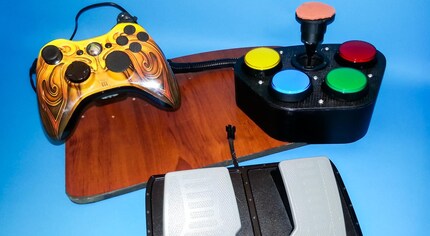
Since the needs are very individual, there are hardly any universal solutions. Non-profit organisations such as Able Gamers or Warfighter Engaged are committed to making it possible for people with disabilities to play video games. They advocate for better support from manufacturers, establish a social network for those affected and develop input solutions themselves. The veteran support organisation Warfighter Engaged has implemented numerous projects in close collaboration with those affected. The solutions they come up with are tailored to specific needs and therefore usually unique.
Most game manufacturers don’t invest much in implementing special options. Why? There’s not much profit to be made. Since there is no legal obligation and people with disabilities make up only a fraction of the buyers, the extra work doesn’t pay off from a financial point of view. How come there are still certain exceptions worth mentioning such as «Spiderman»? This often comes down to affected people expressing their needs. Yet, the decision depends on the goodwill of the game manufacturers.
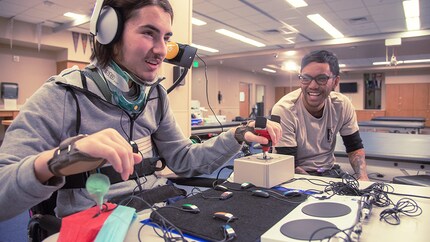
The same problem applies when it comes to controllers: From a financial point of view, it makes little sense for hardware manufacturers to produce such niche products. That's why projects such as the Adaptive Controller are a welcome change, even if it seems to have been primarily a publicity stunt for Microsoft. Nevertheless, with these efforts and the work of numerous non-profit organisations, people with limited mobility, visual impairments and other disabilities can continue to enjoy their digital hobby of gaming. And the world of gaming is one without limits.
As a child, I wasn't allowed to have any consoles. It was only with the arrival of the family's 486 PC that the magical world of gaming opened up to me. Today, I'm overcompensating accordingly. Only a lack of time and money prevents me from trying out every game there is and decorating my shelf with rare retro consoles.

Product test
by Kevin Hofer

Product test
by Kevin Hofer

Product test
by Kevin Hofer